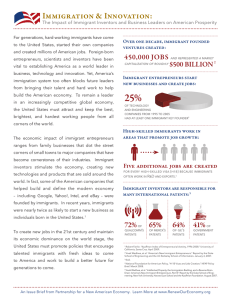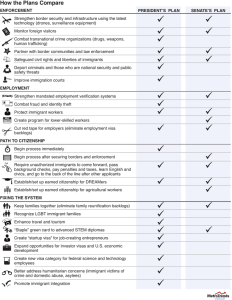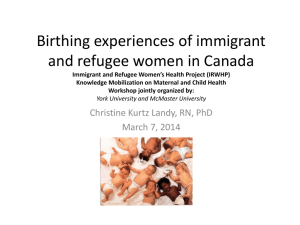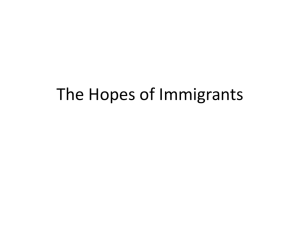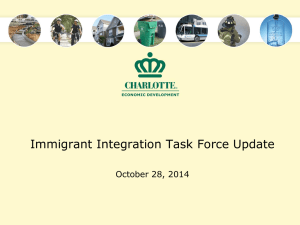Business And Social Profiles Of Immigrant-Owned Small Firms: The Case Of Pakistani Immigrant Entrepreneurs In Greece
advertisement
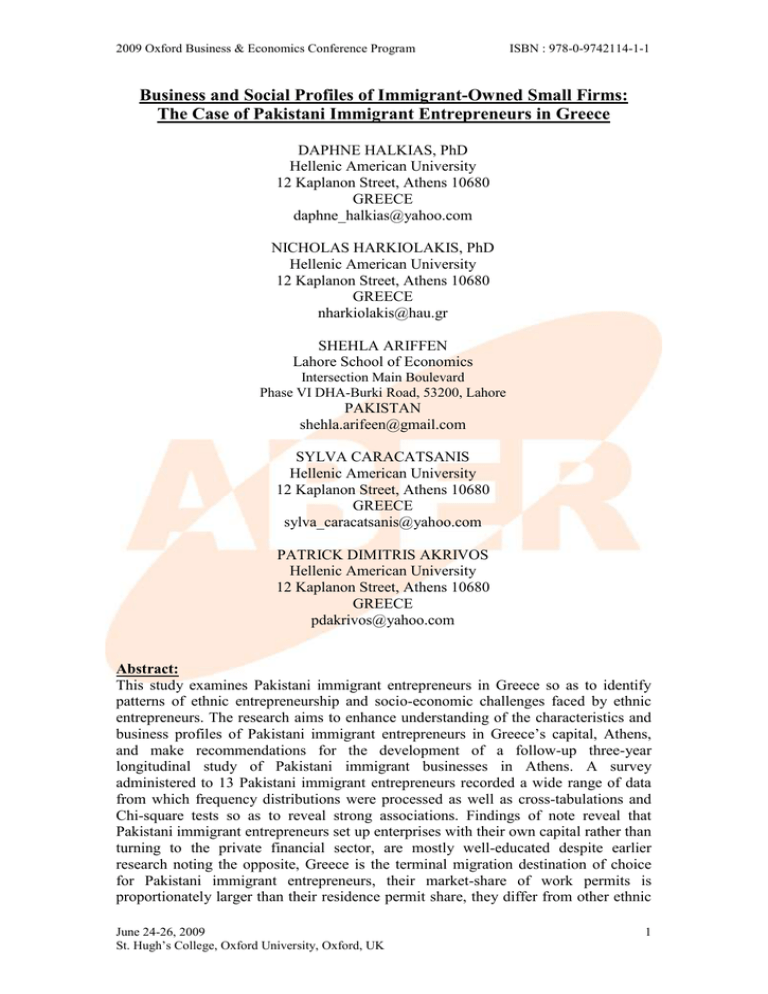
2009 Oxford Business & Economics Conference Program ISBN : 978-0-9742114-1-1 Business and Social Profiles of Immigrant-Owned Small Firms: The Case of Pakistani Immigrant Entrepreneurs in Greece DAPHNE HALKIAS, PhD Hellenic American University 12 Kaplanon Street, Athens 10680 GREECE daphne_halkias@yahoo.com NICHOLAS HARKIOLAKIS, PhD Hellenic American University 12 Kaplanon Street, Athens 10680 GREECE nharkiolakis@hau.gr SHEHLA ARIFFEN Lahore School of Economics Intersection Main Boulevard Phase VI DHA-Burki Road, 53200, Lahore PAKISTAN shehla.arifeen@gmail.com SYLVA CARACATSANIS Hellenic American University 12 Kaplanon Street, Athens 10680 GREECE sylva_caracatsanis@yahoo.com PATRICK DIMITRIS AKRIVOS Hellenic American University 12 Kaplanon Street, Athens 10680 GREECE pdakrivos@yahoo.com Abstract: This study examines Pakistani immigrant entrepreneurs in Greece so as to identify patterns of ethnic entrepreneurship and socio-economic challenges faced by ethnic entrepreneurs. The research aims to enhance understanding of the characteristics and business profiles of Pakistani immigrant entrepreneurs in Greece’s capital, Athens, and make recommendations for the development of a follow-up three-year longitudinal study of Pakistani immigrant businesses in Athens. A survey administered to 13 Pakistani immigrant entrepreneurs recorded a wide range of data from which frequency distributions were processed as well as cross-tabulations and Chi-square tests so as to reveal strong associations. Findings of note reveal that Pakistani immigrant entrepreneurs set up enterprises with their own capital rather than turning to the private financial sector, are mostly well-educated despite earlier research noting the opposite, Greece is the terminal migration destination of choice for Pakistani immigrant entrepreneurs, their market-share of work permits is proportionately larger than their residence permit share, they differ from other ethnic June 24-26, 2009 St. Hugh’s College, Oxford University, Oxford, UK 1 2009 Oxford Business & Economics Conference Program ISBN : 978-0-9742114-1-1 groups by substantial preference for operation of call centers, and they are very much bound to their ethnic enclaves. This body of research offers a unique contribution to an area which has until now been largely ignored. Key Words: Pakistani immigrant entrepreneur, Greece, immigrant-owned business, selfemployment, chain migration, ethnic entrepreneurship, economic integration Introduction and Purpose of the Study Since the post-colonial period South Asian states have enacted a pro-emigration policy. This is especially true in the case of Pakistan (Kibria, 2008; Hamid, 2007), which will soon also claim status as one of the top sending countries of clandestine migration (Düvell, 2008). Poros (2008) refers to a United Nations 2006 report showing Pakistan as one of the top five nations in terms of overall migrant outflow. This is understandable considering that the 2006 Failed State Index places the country ninth out of the world’s top 10 failed nations (Hamid & Siegmann, 2007). The Overseas Pakistani Foundation (OPF) in 2005 gave an estimate of some seven million Pakistanis living beyond the borders of their homeland, while Hamid & Siegmann (2007) note this number to be around four million. As a European Union (EU) country in Southern Europe, Greece has also experienced rapid growth in immigrant and refugee populations since 1990. Most have settled in the urban centers, primarily in Athens, the nation’s capital. This is evidenced in part by the smattering of fresh produce and varied ethnic goods stores owned by Pakistani immigrants in Athens’ city center (Halkias et al., 2007a; Tzilivakis, 2005). In Greece, most immigrants start small businesses in their quest to become economically self-sufficient, send money back to relatives in their countries of origin, serve the consumer needs of fellow newcomers, and integrate into community life. According to research published by Baldwin-Edwards of the Mediterranean Migration Observatory (MMO) at Athens Panteio University, up to 2004 more than 80,900 residence permits had been issued to immigrants who declared themselves selfemployed (Halkias et al., 2007a). The purpose of this research is three-fold: 1) to determine characteristics and business profiles of small firms owned and operated by Pakistani immigrant entrepreneurs in Athens, Greece’s capital city and largest urban center, 2) to view ethnic enterprise as a means of socio-cultural integration in the host society, aiming to reveal rich and varied forms of economic self-organisation, and 3) based on results of this preliminary study, recommendations are made for developing a follow-up three-year longitudinal study of Pakistani immigrant businesses in Athens. With the results of this four-year study, recommendations will be made to government and private-sector agencies in OECD countries for policy formulation to support and encourage 1) sustainable small-scale economic development activities by Pakistani immigrants and determine ways to integrate these small businesses into existing urban economic development projects and strategies, and 2) social policy addressing issues of immigrant social exclusion and successful community integration. June 24-26, 2009 St. Hugh’s College, Oxford University, Oxford, UK 2 2009 Oxford Business & Economics Conference Program ISBN : 978-0-9742114-1-1 Review of the Literature The Path of Pakistani Migrants to Europe Factors influencing Pakistani emigration to Europe include poor health indicators, subsistence-level survival, natural disasters affecting crops, state development inadequacies, political uncertainty, and the opportunity to benefit from remittances (Hamid, 2007; Hamid & Siegmann, 2007; Maqsood, 2008). No matter the motivating force, the significance of clandestine migration lies in the development of ‘established immigrant communities’ or ethnic clusters as in the case of Pakistanis in the United Kingdom (UK) (Düvell, 2008; Constant & Zimmermann, 2005). However, the aforementioned pattern points to social networks as a major driving force of relational-migration considering that future socio-economic prospects are deemed more readily accessible (Poros, 2008) and, as in the case of Greece, a flourishing informal economy buffers formal market and cultural exclusion (Düvell, 2008; Joppke, 1998). Other factors keeping migrants, and Pakistanis in particular, rooted in their European country of entry have to do with the risks taken in traversing vast geographical expanses and costs associated with a period of income nongeneration, travel expenses, and being uprooted from home, family and friends (Düvell, 2008; Constant & Zimmermann, 2005). This mode of labor-seeking and family-reunification chain migration has seen Pakistani emigrants since as long ago as the 1950s settle in countries such as the UK (Antonopoulos & Winterdyk, 2006, quoting Schloenhardt, 2001), Norway (Ostberg, 2003), and, in the 1970s, the Persian Gulf states (Düvell, 2008; Hamid & Siegmann, 2007). In fact, the Pakistani immigrant population is Norway’s largest (Ostberg, 2003), while the United Arab Emirates (UAE) and Saudi Arabia still represent the top host countries for working Pakistanis (Hamid & Siegmann, 2007). Greece as ‘Home’ to Increasing Numbers of Pakistani Migrants In light of the above, socio-economic factors driving Pakistani chain migration may ultimately give rise to an established Pakistani migrant population in Greece, albeit not with the greatest of ease. Modes of entry are increasingly reported to be via sea through smuggling groups active in Istanbul, one of the region’s primary assembly points. The average price is in the range of USD 3,000 to 7,000 (Antonopoulos & Winterdyk, 2006). What impels African, Iranian, Iraqi, Kurdish, Afghan, Indian and Pakistani migrants to risk life and limb to enter Southern European states? The increasing numbers of Pakistanis in Greece are due to a wide variety of factors, including porous borders, lackluster immigration policies, black market trade opportunities, and even hostcountry political instability (Poros, 2008). On the part of the host-country, cheap labor (as offered by these South Asian immigrants) appears to diffuse the costs of overpopulation and social expenses feared by natives of the South Mediterranean region (Joppke, 1998). These aspects of Greece’s ‘subtle’ ‘head-in-the-sand’ (non) approach to immigration have resulted in some one million immigrants constituting a major percentage of the nation’s recorded 11 million inhabitants (Poros, 2008). The state’s ‘criminalization’ of immigrants – in terms of the threat of pecuniary punishment, incarceration, deportation, and limited social services – may in fact contribute to immigrant tenacity June 24-26, 2009 St. Hugh’s College, Oxford University, Oxford, UK 3 2009 Oxford Business & Economics Conference Program ISBN : 978-0-9742114-1-1 in establishing themselves in Greece once issues of housing and income generation have been provided for (Düvell, 2008; Poros, 2008; Constant & Zimmermann, 2005). While Pakistanis and Indians make up 2.5 percent of foreigners in Greece, they make up 3.9 percent of all working foreigners (Rovolis & Tragaki, 2006, quoting the 2001 Population Census). However, around 50 percent of Pakistani migrant workers are reported to have low levels of education (Maqsood, 2008; Constant & Zimmermann, 2005; Campbell & McLean, 2003) and, in Greece, are one of the top three leasteducated migrant groups (Rovolis & Tragaki, 2006). Pakistanis Drive Self-Employment Ventures in Greece Notwithstanding low education levels – in direct contrast to the mostly highly educated Africans entering Greece – entrepreneurial ventures often reward a wide range of personal attributes, including an openness to risk-taking, ambitious aspirations, motivation, and resourcefulness (Halkias et al., 2009a; Rovolis & Tragaki, 2006). These character traits are in high demand considering research that affirms the difficulties encountered by Pakistani immigrants in securing salaried labor (Kogan, 2007). Hatziprokopiou (2008) refers to such populations as ‘disadvantaged’ survival and ethnic entrepreneurs. Blocked employment opportunities call for innovation and drive, especially considering the 2001 Population Census noting that 92.3 percent of Pakistanis and Indians entered Greece for purposes of work (Rovolis & Tragaki, 2006). Many ethnic groups have risen to the challenge of self-employment, not least of which the Pakistani immigrant group. Tzilivakis (2005) also makes mention of the 2005 MMO report authored by Baldwin-Edwards noting that ethnic entrepreneurship has evolved as a significant survival tactic for economic gain by Greece’s immigrants. This is witnessed and borne out in a recent study which refers to Ministry of the Interior data revealing that Pakistanis hold 4.1 percent of all permits granted to immigrants for independent economic activities while constituting just 2.5 percent of foreign residence permits (Hatziprokopiou, 2008). Literature highlighting the industries of Pakistani immigrant entrepreneurs in Greece is at best spotted with references. However, studies of immigrant entrepreneurship in Greece in general note that Pakistanis operate small catering businesses, and are active in retail trade and tourism services (Fakiolas, 1999). It has also been noted in research that an unknown percentage of Pakistani immigrants even drive income generation through street selling of contraband (Antonopoulos, 2008). Socio-Cultural Issues Influencing Integration of Pakistani Immigrants in Greece While there is general consensus that immigrant entrepreneurs play a vital role in Greece’s economic growth (Kassimis & Kassimi, 2004), there is a need for greater understanding of their influence at a socio-cultural level given that a large majority (80 percent according to the 2001 Population Census) of the country’s immigrant population hails from less-developed nations (Baldwin-Edwards, 2005). This has many implications beyond economic considerations as ethnic clustering, imposed by both locals and immigrants themselves (Campbell & McLean, 2003), serves to maintain an ‘us’ and ‘them’ worldview that keeps integration and assimilation at bay (Halkias et al., 2009b). This invariably keeps immigrants at the underprivileged pole of access to social and public services – the significance of which has particular June 24-26, 2009 St. Hugh’s College, Oxford University, Oxford, UK 4 2009 Oxford Business & Economics Conference Program ISBN : 978-0-9742114-1-1 ramifications for the future economic and social inclusion of second and third generation immigrants (Düvell, 2008). In the case of Pakistani immigrants, isolation from the local and wider social environment has much to do with the group’s social norms, strict adherence to traditional living arrangements and religious convictions (Kay, 2006; Campbell & McLean, 2003). This is most noticeable upon examination of their gendered migration and labor patterns, for example, which reveal that for every 37.5 Pakistani and Indian working men there is just one working woman (Rovolis & Tragaki, 2006). Although a study of “Daughters of Islam” in the UK reported second generation Pakistani and Bangladeshi women as earning educational degrees and professional qualifications (Kay, 2006), similar information was not forthcoming for Greece. Research indicates that despite Pakistani immigrant groups being partially influenced by the host society, an unwavering aversion to venturing beyond the ethnic enclave (Campbell & McLean, 2003) perpetuates ongoing low education levels, overcrowded housing, and continued labor market exclusion (Simpson et al., 2008). Academic investigation into the need for immigration policy reassessment and the introduction of an assimilationist agenda cannot ignore the significance of the aforementioned when considering that Greece’s Pakistani immigrants top the ranks of those holding steadfast to ethnic enclave strategies (Rovolis & Tragaki, 2006). Research Methodology The criteria for inclusion in this study were that an immigrant-owned business is one that is owned and managed by the immigrant and/or more than one family member (Hollander & Elman, 1988; Astrachan & Astrachan, 1993). This definition is clearly less restrictive than other definitions because it is not dependent on the involvement of multiple family members (Winter et al., 1998). A second reason for adopting a broad definition is that this paper is an exploratory study and our sample represents a relatively small number of Pakistani-owned businesses in Athens. The sample of this study focuses on Pakistani immigrant businesses. A contact from the Friendship Association that oversees Pakistani socio-cultural activities gave researchers further contacts for Pakistani immigrant entrepreneurs, while some were identified through their advertisements in local newspapers. In addition, the study’s Research Assistants conducted a field search in the Pakistani immigrant community from personal contact sources in the Athens metro area. The sample represented the primary industries for Pakistani entrepreneurial activity: call centers, retail, and food and beverage. The interview survey was taken to the business owners by one of the study’s Research Assistants who on average spent 30 to 60 minutes interviewing the subjects and writing down the respondents’ answers on the survey itself. Fifty valid interview surveys were completed by the Research Assistants and used in the study’s data analysis. The survey was written in English and there was no need for any translation by the Research Assistants conducting the individual interviews since the Pakistani immigrants either spoke English or Greek. The demographic questions included: age, gender, marital status, number of children, relationship to the owners, and level of June 24-26, 2009 St. Hugh’s College, Oxford University, Oxford, UK 5 2009 Oxford Business & Economics Conference Program ISBN : 978-0-9742114-1-1 formal/informal technical trading education. The remaining questions in the first section were open-ended and pertaining to perceptions of the immigrant owners on their relationship to their own immigrant group, their relationship to the host society, and the effect of the global business environment on immigrant entrepreneurship. A final open-ended question allowed the respondents to add any further individual perceptions they wished, which were not included in the survey. The second section of the interview survey collected business data (industry sector, financial data, marketing, growth/expansion strategy, technology, distribution channels, employee profiles, supplier profile, and customer profile). According to this information, data was collected and analyzed to formulate a picture of the immigrant entrepreneur’s social profile and key characteristics comprising the business profile of each firm. Research Participation Rates Identifying immigrant small businesses was the first phase of research. The second, and by far the most challenging and time-consuming, was building the rapport necessary to actually conduct interviews. Among the 52 immigrant businesses identified, in-depth interviews were conducted with 13 business owners. Immigrants are consistently reluctant to give interviews to researchers. Many of their reasons for declining participation in research are similar to those of established-resident business owners: reluctance to share financial information, concerns about the potential benefits for their competitors, etc. However, immigrant business owners often have additional reasons to decline research participation: language barriers, concerns that their business practices or personal lives will draw the attention of authorities with whom they remain unfamiliar or even suspicious of, potential exposure of their employment of undocumented immigrants, etc. (Grey et al., 2004). Some newcomer business owners granted interviews on the initial day of contact. Others granted interviews only after several weeks of persistent inquiries. Some business owners did not live in the same community, forcing a potentially long wait to arrange an interview. Even among those business owners who were interviewed, there was reluctance to answer every question in the interview protocol. This was particularly the case in terms of financial information. In order to encourage participation, business owners were assured through signed informed consent forms that the name and specific location of their business would not be identified in this survey. Data Results and Analysis Demographics A sample of 13 immigrant entrepreneurs from Pakistan were interviewed in the center of Athens and the results collected were analyzed. Criteria for inclusion in this study were that an immigrant-owned business is one that is owned and managed by the immigrant and/or more than one family member (Hollander & Elman, 1988; Astrachan & Astrachan, 1993). This definition is clearly less restrictive than other definitions because it is not dependent on the involvement of multiple family members (Winter et al., 1998). A second reason for adopting a broad definition is that this paper is an exploratory study and our sample represents relatively young and June 24-26, 2009 St. Hugh’s College, Oxford University, Oxford, UK 6 2009 Oxford Business & Economics Conference Program ISBN : 978-0-9742114-1-1 small immigrant-owned businesses. The survey used (Halkias et al., 2007a; Halkias et al., 2007b; Halkias et al., 2008; Halkias et al., 2009a, Halkias et al., 2009b; Halkias et al., 2010 forthcoming) has been validated and used in similar occasions. Tracking and locating the Pakistani entrepreneurs proved very challenging and it was even more difficult to find subjects agreeing to participate in the survey. Graduate students of Hellenic American University and research assistants were used to conduct the interviews. The great majority of Pakistani immigrant entrepreneurs (62 percent) are between the ages of 30 and 40. Comparing this figure with the number of years they have been in Greece we can say that most of them came to Greece in their middle twenties (85 percent indicated that they have been in Greece for five to 15 years). The majority of them (54 percent) started their entrepreneurial activity during their first five years, while the rest started later. This is an indication that as soon as the immigrants gathered enough financial resources they ventured into becoming business owners. With the exception of two that said they entered the country illegally, all others declared they got a visa/work permit when they were invited by relatives. Eighty-four percent chose Greece because of perceived economic opportunities and 38 percent were motivated by relatives they already had in Greece. Sixty-two percent came alone while the rest came with friends, relatives or co-workers as they declared. With the exception of three, everybody in our sample is married with children. Regarding their educational level, 77 percent have reached only secondary education levels with the rest having undergraduate degrees in business and information technology (IT). No one in our sample received any education or training in Greece. Seventy percent of the subject’s sample see Greece as a terminal destination and have no plans for further immigration. This is correlated with the fact that, with the exception of one, none has lived in another country as an immigrant before coming to Greece. It appears that Greece is the target terminal destination from the beginning. Data Regarding the Pakistani Immigrants’ Business Life Cycle In order to become financially independent and control their own destiny, Pakistani immigrants venture into entrepreneurship. Inspired by local immigrant entrepreneurs (23 percent) and other family members that were already entrepreneurs (31 percent) the immigrants start their business after saving enough for a start-up operation. Seventy-seven percent are single owners while the rest started businesses with a 50 percent with a relative or friend from the same ethnic group. A significant crosstabulation (Chi-Square = 0.002) revealed that only those with tertiary education levels formed partnerships. That could be an implication that the lower the education level, the stronger the need to control operations. Further investigation is needed in order to establish such relationships. When asked if they continually search for new opportunities, 46 percent said they strongly agree with that statement meaning it represents their perspective and outlook on business activities. Half of them felt competition from other immigrants while only two said they felt competition from Greeks. Interestingly, both the latter individuals had tertiary education degrees while all the rest only reached secondary education levels (Chi-Square = 0.005). A possible explanation is that they focus on different products or deal with a market segment that host entrepreneurs do not address. Also, June 24-26, 2009 St. Hugh’s College, Oxford University, Oxford, UK 7 2009 Oxford Business & Economics Conference Program ISBN : 978-0-9742114-1-1 those that felt competition from local entrepreneurs were Internet café and retail store owners – entrepreneurial activities Greeks are also involved in. Driven from the opportunity to fill a market need (60 percent), Pakistani entrepreneurs are involved in a variety of operations. An interesting finding that differentiates Pakistani entrepreneurs from other immigrant groups (Halkias et al., 2007a; Halkias et al., 2007b; Halkias et al., 2008; Halkias et al., 2009a, Halkias et al., 2009b; Halkias et al., 2010 forthcoming) was a type of business that was not observed in other groups. Thirty-one percent reported they operate call centers primarily for Pakistani and Bangladeshi immigrants that need to communicate with their families in their native country. This is an indication of strong relationships with their relatives and friends back home. Another 38 percent of Pakistani entrepreneurs were involved in minimarket operations while the rest were distributed in other activities. Pakistani entrepreneurs in Greece financed their start-up exclusively from personal savings and loans from friends and relatives instead of turning to micro-financing (only one did not answer the relevant questions). This may be an outcome of Greece’s laws that prohibit immigrant entrepreneurs from accessing bank loans unless they have sufficient initial funding. The immigrants did not seem to be aware of government support (although limited) that could assist them in their venture. As Pakistani immigrant entrepreneur businesses matured, we observed contributions from revenues indicating successful business outcomes. When asked directly if they had financial difficulties, only three said they did not have any financial difficulties at the birth of their enterprise. At later stages of the business’ life cycle, there is a direct relationship between perceived financial difficulties with the success of the venture. By the early business stages, 54 percent consider their venture successful with 31 percent unwilling to provide information, and the rest remained unsure about their level of success. Interestingly, 62 percent already use computers in their businesses primarily for Internet and billing. This makes sense given the types of businesses recorded (31 percent had call centers and one had an Internet cafe). Finally, mixed feelings were recorded regarding their confidence level in their skills and fear of failure during the birth, early years and maturity stages of the business life cycle. At the birth stage, 45 percent were unsure about their capability to succeed in their business while the rest were confident about their skills. At the early stages of up to three years from the birth of the business (Halkias et al., 2007a; Halkias et al., 2007b; Halkias et al., 2008; Halkias et al., 2009a, Halkias et al., 2009b; Halkias et al., 2010 forthcoming), four of them had their confidence increased while another four had their confidence reduced. This might be a reflection of the success or failure of the venture that seems to have a direct impact on the confidence level of the entrepreneur. In accordance with this finding, opposite trends were observed regarding their fear of failure. Socio-Cultural Perceptions of Pakistani Immigrant Entrepreneurs Adaptation to Greek culture seems controversial to the participants in our sample, with conflicting views being recorded. With the exception of one subject, all others said they perceived racism from the local population. Only one references dress code as a problem. Thirty-one percent said they did not feel their personal safety was June 24-26, 2009 St. Hugh’s College, Oxford University, Oxford, UK 8 2009 Oxford Business & Economics Conference Program ISBN : 978-0-9742114-1-1 threatened, 31 percent felt clear threats for their safety, and 38 percent refused to answer the relevant question. Additional issues raised by the subjects from our sample were the lack of places of worship and communication problems. A significant relationship was revealed (ChiSquare = 0.006) when cross-tabulating these issues with the educational level of the immigrant. It appeared that those with only up to secondary education levels responded they either had no adaptation issues or their only concern was the lack of a place of worship. The participants with tertiary education were more concerned about restrictions on their freedom and communication issues. Sixty-two percent of Pakistani immigrant entrepreneurs in the study’s sample employed personnel (only males) from the same ethnic group – the majority of whom were relatives or friends. Gender bias regarding entrepreneurial opportunities was observed but not to the degree expected. A surprising 31 percent believe both sexes have the same rights in working. Given that our entire sample is composed of males it is interesting to see if their exposure to a Western type society has influenced the way they perceive women having access to entrepreneurial opportunities. Thirty-eight percent believe males have favorable opportunities because women are for family issues. This is in accordance with the general perception that women have a different purpose in life than running a business, as well as religious and cultural restrictions set upon women outside the home. Regarding their suppliers, 30 percent of the sample indicated their suppliers were from the same ethnic group as the immigrants indicating an immigrant community with strong ethnic identity. This evidence is further supported by the fact that 46 percent indicated their ethnic community was supportive by being customers and 38 percent said they felt the Pakistani immigrants were helping each other. Regarding any barriers the immigrants perceived in their new environment, they felt their immigrant community was supportive and that their neighborhoods (local community) did not cause them any problems (62 percent). While racism was recorded as a general perception of the Pakistani entrepreneurs it seems that on faceto-face interaction with the local community this was not present. The Pakistani immigrants in our sample unanimously agreed that continued personal interactions with host country nationals act to eliminate differences in multicultural settings. They also unanimously reported two obstacles in starting and maintaining an immigrant entrepreneurial venture: firstly, the laws and policies of Greece towards immigrant entrepreneurs and, secondly, the language barrier. Conclusions and Discussion This paper is about the important role of Pakistani immigrant entrepreneurial activity in Greece and asks two main questions: 1) what are the characteristics of Pakistaniowned small businesses?, and 2) what are the socio-cultural factors influencing the ongoing development of entrepreneurial activities of Pakistani immigrant businesses in metro-Athens? The study’s findings are summarized and theoretical implications are discussed. While a relatively small study, the Pakistani immigrant entrepreneurs provide evidence of some clear business trends. As immigrants, they are predominantly wellJune 24-26, 2009 St. Hugh’s College, Oxford University, Oxford, UK 9 2009 Oxford Business & Economics Conference Program ISBN : 978-0-9742114-1-1 educated individuals who have established small enterprises independent of the private financial sector or public sector support. They represent a limited cross-section of products and services but are primarily focused on supplying the needs of the immigrant community from which they come. In addition to reliance on their own communities for their customer base, these enterprises are similarly dependent on that community for financial support and expertise. This self-reliance is further entrenched by the perceived lack of proactive state support for their endeavours and what is perceived as a strong cultural barrier in terms of their language difficulties and social and religious customs. In summary, several trends emerge from the study’s survey findings on Pakistani immigrant entrepreneurs starting small businesses in Greece. These businesses largely focused on retail or service sectors, are mostly married-male run, are sole proprietorships, and are focusing on growing/expanding their products and services in markets dominated by Pakistani or South Asian customers and Greek suppliers. Family networks are key to success as most (Greek) suppliers to these businesses are acquaintances of the owners. However, these businesses use multiple distribution strategies and have mostly a homogenous customer base. Specific information about the number of customers served and sales was difficult to obtain. Most interviewees were reluctant to provide even estimates of customers and sales, fearing their competition would benefit, or there were tax and/or regulatory implications. Nonetheless, the data collectors did obtain some interesting information. During the survey interview, immigrant entrepreneurs would often engage in casual, “off the record” discussions with the data collectors about various aspects of Pakistani immigrant entrepreneurship in Greece. While not part of the actual data collection and analysis, many of these discussions focused on similar themes that are worth noting for the purposes of discussion and making recommendations for further research on the subject of Pakistani immigrant entrepreneurship in Greece and even in other EU countries. Recommendations for Further Research This study is, by its very nature and methodology, a preliminary study. Internally, it is a small sample readily accessible in urban Athens. Externally, there is no comparison with other migrant groups in Greece or other Pakistani migrant groups in other European countries. With increase of size and scope, the research will be able to properly inform academe, and social and economic policy makers, as well as prospective migrant entrepreneurs. In particular, ongoing research will enable recommendations to be made to government and private sector agencies for policy formulation and deployment on: a) Sustainable small-scale economic development activities by immigrant entrepreneurs, b) Financial, social, political, and legislative supports that encourage ongoing migrant entrepreneurship and social inclusion, and c) Integration of migrant entrepreneurial businesses into existing community economic capacity building projects and strategies. June 24-26, 2009 St. Hugh’s College, Oxford University, Oxford, UK 10 2009 Oxford Business & Economics Conference Program ISBN : 978-0-9742114-1-1 To achieve this, the next step of this process is an additional expanded study on Pakistani immigrant entrepreneurs. Such a study will need to address cross-sectional surveying and analysis that will enable an even more insightful view of migrant entrepreneurial ventures. Specifically, additional research needs to focus on: Longitudinal analysis: Look at what business “life stage” each firm is in and characterize its capital structure – mix of debt, savings, reinvestment of profits, etc. – based on these life stages. Based on the preliminary results of this study, recommendation is made for a follow-up three-year longitudinal study of Pakistani immigrant businesses in Athens. The follow-up research will use a “small n” case study research method for longitudinal analysis of entrepreneurial ventures at all stages of their business life cycle (Naumes et al., 2007). Comparative analysis: Look at the contrasts and comparisons with other groups, both nationally and internationally. Expansion and growth: Take a closer look at the expansion and growth strategies, including whether growth will be “organic” – same owner – or via alliances, mergers, etc. This closer look could also investigate why some of these firms are closing down. Remittance impacts: Determine how much of business profits are remitted back to immigrants’ home countries. Supplier analysis: Take a supply-side view and see how Greek suppliers view these business customers. Are they able to price discriminate? Do they provide better deals for these start-up businesses? Do Greek suppliers view these business owners as friends, too? Customer segmentation: Better understand customer segments – demographics, psychographics, profitability, etc. – for these businesses. While one would expect to see a large cultural skew in the customer bases, one was not seen, and a better understanding of why would be helpful for future promotion and growth strategies. June 24-26, 2009 St. Hugh’s College, Oxford University, Oxford, UK 11 2009 Oxford Business & Economics Conference Program ISBN : 978-0-9742114-1-1 References 1) Antonopoulos, G.A. (2008), “The Greek Connection(s): The Social Organization of the Cigarette-Smuggling Business in Greece”, European Journal of Criminology, Vol. 5(3), pp. 263-288. 2) Antonopoulos, G.A. and Winterdyk, J. (2006), “The Smuggling of Migrants in Greece: An Examination of its Social Organization”, European Journal of Criminology, Vol. 3(4), pp. 439-461. 3) Astrachan, J.H. and Astrachan, B.M. (1993), “Family Business: the Challenges and Opportunities of Interprofessional Collaboration”, in Aronoff, C.E., Astrachan J.H. and Ward J.L. (Eds.), Family Business Sourcebook, 2. Marietta: Business Owner Resources, pp. 535-546. 4) Baldwin-Edwards, M. (2005), “The Integration of Immigrants in Athens: Developing Indicators and Statistical Measures”, pre-final version. Available at: http://www.mmo.gr/pdf/publications/mmo_working_papers/Migrants_in_Gree ce_Report_Eng.pdf (last accessed January 16, 2009). 5) Campbell, C. and McLean, C. (2003), “Social Capital, Local Community Participation and the Construction of Pakistani Identities in England: Implications for Health Inequalities Policies”, Journal of Health Psychology, Vol. 8(2), pp. 247-262. 6) Constant, A. and Zimmermann, K.F. (2005), “Immigrant Performance and Selective Immigration Policy: A European Perspective”, National Institute Economic Review, No. 194, pp. 94-105. 7) Düvell, F. (2008), “Clandestine Migration in Europe”, Social Science Information, Vol. 47(4), pp. 479-497. 8) Fakiolas, R. (1999), “Socio-Economic Effects of Immigration in Greece”, Journal of European Social Policy, Vol. 9(3), pp. 211-229. 9) Grey, M.A., Rodriguez, N.M. and Conrad, A. (2004), “Immigrant and Refugee Small Business Development in Iowa”, A Research Report with Recommendations. UNI New Iowans Program and UNI Institute for Decision Making, November. 10) Halkias, D., Harkiolakis, N., Abadir, S., Thurman, P., Akrivos, D. and Caracatsanis, S. (2007a), “Characteristics and Business Profiles of ImmigrantOwned Small Firms: The Case of Albanian Immigrant Entrepreneurs in Greece”, research paper prepared for conference presentation at the Oxford Business and Economics Research Conference, Oxford, UK, June. 11) Halkias, D., Harkiolakis, N., Abadir, S., Thurman, P., Akrivos, D. and Caracatsanis, S. (2009a), “Albanian Immigrant Entrepreneurship in Greece”, Journal of Developmental Entrepreneurship, Syracuse University Press. (forthcoming June) 12) Halkias, D., Harkiolakis, N., Caracatsanis, S. and Akrivos, D. (2007b), “Implications of Minority-Owned Family Enterprises on the Greek Economy”, paper presented at OBEC (Oxford Business and Economics Conference) 2007, Oxford University, England, June 24-26. 13) Halkias, D., Harkiolakis, N., Nwajiuba, C., Akrivos, D. and Caracatsanis, S. (2008), “Characteristics and Business Profiles of Immigrant-Owned Small Firms: The Case of African Immigrant Entrepreneurs in Greece”, paper presented at OBEC (Oxford Business and Economics Conference) 2008, Oxford University, England, June 22-24. June 24-26, 2009 St. Hugh’s College, Oxford University, Oxford, UK 12 2009 Oxford Business & Economics Conference Program ISBN : 978-0-9742114-1-1 14) Halkias, D., Nwajiuba, C., Harkiolakis, N. and Caracatsanis, S. (2010), “Challenges Facing Women Entrepreneurs in Nigeria, in Management Research News (Special Issue of MRN on Small Business Development and Poverty Alleviation in Africa), Emerald. (forthcoming publication Vol. 33[5], May, pp. XXX) 15) Halkias, D., Nwajiuba, C., Harkiolakis, N., Clayton, G., Akrivos, D. and Caracatsanis, S. (2009b), “Characteristics and Business Profiles of ImmigrantOwned Small Firms: The Case of African Immigrant Entrepreneurs in Greece”, International Journal of Business Innovation and Research, Vol. 3 No. 5. pp. XXX (Inderscience Enterprises Ltd.). (forthcoming) 16) Hamid, H. (2007), “Transnational Migration: Addressing or Importing Risk”, Institute of Social Studies, The Netherlands, Conference: International Migration, Multi-local Livelihoods and Human Security, August 30-31. 17) Hamid, H. and Siegmann, K.A. (2007), “Migration – Addressing or Importing Risk?”, SDPI Research and News Bulletin, Vol. 14 No. 1. Available at: http://www.sdpi.org/help/research_and_news_bulletin/jan_march_07/migratio n.html (last accessed February 06, 2009). 18) Hatziprokopiou, P. (2008), “Migrant entrepreneurship in Greece”, Migrações #3, pp. 73-84. Available at: http://www.oi.acidi.gov.pt/docs/Revista_3_EN/Migr3_Sec1_Art4_EN.pdf (last accessed December 05, 2008). 19) Hollander, B.S. and Elman, N.S. (1988), “Family-Owned Businesses: An Emerging Field of Inquiry”, Family Business Review, Vol. 1, pp.145-164. 20) Joppke, C. (1998), “Why Liberal States Accept Unwanted Immigration”, World Politics, Vol. 50(2), pp. 266-293. Available at: http://muse.jhu.edu/journals/world_politics/v050/50.2joppke.html (last accessed January 17, 2009). 21) Kassimis, C. and Kassimi, C. (2004), “Greece: A History of Migration”. Available at: http://www.migrationinformation.org/Profiles/display.cfm?ID=228 (last accessed April 01, 2008). 22) Kay, T. (2006), “Daughters of Islam: Family Influences on Muslim Young Women’s Participation in Sport”, International Review for the Sociology of Sport; Vol. 41(3-4), pp. 357-373. 23) Kibria, N. (2008), “Muslim Encounters in the Global Economy: Identity Developments of Labor Migrants from Bangladesh to the Middle East”, Ethnicities, Vol. 8(4), pp. 518-535. 24) Kogan, I. (2007), “Working Through Barriers: Host Country Institutions and Immigrant Labour Market Performance in Europe”, Springer Netherlands, pp. 243. 25) Maqsood, A.J. (2008), “Migration Trends from Pakistan”, SDPI Research and News Bulletin, Vol. 15 No. 3. Available at: http://www.sdpi.org/help/research_and_news_bulletin/july_sept_08/Migration %20Trends.html (last accessed February 06, 2009). 26) Naumes, W., Naumes, M. and Merenda, M. (2007), “A Case Based Analysis of the Stages of Entrepreneurial Growth: A Preliminary Study”, Int. J. Case Method Research and Application, XIX, 1. 27) Overseas Pakistan Foundation (OPF) (2005), “Overseas Pakistan Foundation Yearbook”. Available at: http://www.opf.org.pk/opd/yearbk/YEARBK.pdf (last accessed February 12, 2009). June 24-26, 2009 St. Hugh’s College, Oxford University, Oxford, UK 13 2009 Oxford Business & Economics Conference Program ISBN : 978-0-9742114-1-1 28) Ostberg, S. (2003), “Norwegian-Pakistani Adolescents: Negotiating Religion, Gender, Ethnicity and Social Boundaries”, Young (Nordic Journal of Youth Research), Vol. 11(2), pp. 161-181. 29) Poros, M.V. (2008), “A Social Networks Approach to Migrant Mobilization in Southern Europe”, American Behavioral Scientist, Vol. 51 No. 11, pp. 16111626. 30) Rovolis, A. and Tragaki, A. (2006), “Ethnic Characteristics and Geographical Distribution of Immigrants in Greece”, European Urban and Regional Studies, Vol. 13(2), pp. 99-111. 31) Simpson, L., Gavalas, V. and Finney, N. (2008), “Population Dynamics in Ethnically Diverse Towns: The Long-term Implications of Immigration”, Urban Studies, Vol. 45, pp. 163-183. 32) Tzilivakis, K. (2005), “The Enterprising Newcomer: Immigrants are Making their Mark on the Greek Small-business Sector”, Athens News Promotional Supplement, June. Available at: http://www.athensnews.gr/Immigration/1immi14.htm (last accessed December 07, 2008). 33) Winter M., Fitzgerald, M.A., Heck, R.K.Z., Haynes, G.W. and Danes, S.M. (1998), “Revisiting the Study of Family Business: Methodological Challenges, Dilemmas, and Alternative Approaches”, Family Business Review, Vol. 11 No. 3, pp. 239-252. June 24-26, 2009 St. Hugh’s College, Oxford University, Oxford, UK 14


